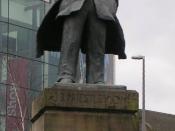In order to analyse the theme of collective responsibility in 'An Inspector Calls' one must elaborate on how certain characters in the play lack responsibility and how Inspector Goole intends to show them the errors of their ways. First and foremost, Priestley draws the reader in through his controversial but interesting message; however this message only applies to the older generation of the 50's mainly due to the fact it was set in 1912. He preys on the upper class to be irresponsible towards others and to establish them as callous individuals. When the inspector arrives and attempts to put them in their place, Eric and Shelia can see how morally wrong they are whereas the older generation, as in Mr and Mrs Birling cannot. Priestley demonstrates the divide between old and young taking place. The older generation refuse to change or take responsibility for their actions, whereas the younger upper class generation can still have their way of thinking altered with a little persuasion and intimidation, in this case from the mouthpiece of Priestley, the Inspector.
In 'An Inspector Calls' the first occurrence of the theme was made just after Mr Birling's opening monologue, "a man has to make his own way-has to look after himself." From this quote, it is easy to deduce how Mr Birling does not think that people have any responsibility and that he has an 'every man for himself' policy. J.B. Priestley uses many different language techniques in order to show this such as dramatic irony. Dramatic irony is expressed in the play as Mr Birling; a respected higher class citizen is shown to not know anything and is shown to not have any sort of collective responsibility, from very early on in the play. Priestley uses Mr Birling as...


